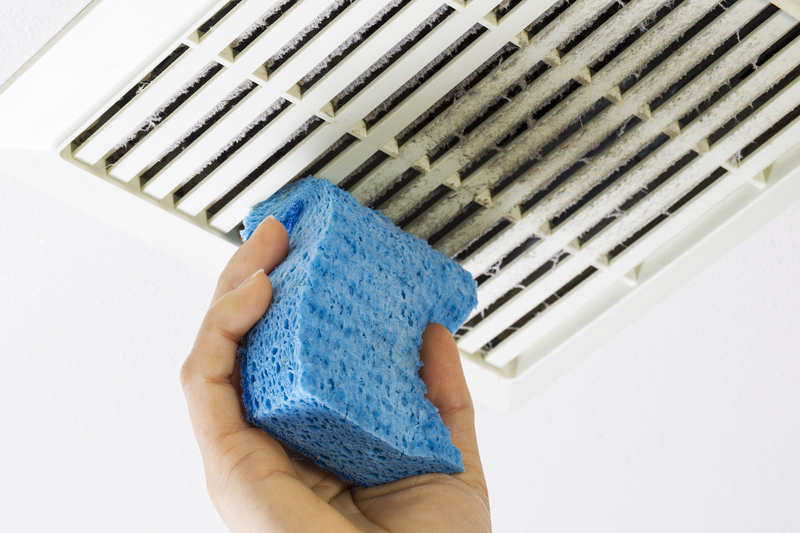Simple Steps to Ensure Your Home is Free from Pet Odor
Posted on 17/08/2025
Simple Steps to Ensure Your Home is Free from Pet Odor
If you're a pet owner, you know how much love and joy your furry companions bring into your life. But let's face it--pet odor is one of the most challenging downsides to sharing your home with animals. Whether you have dogs, cats, or any other pets, keeping your house smelling fresh can sometimes feel like an endless battle. Eliminating pet odor isn't just about pleasant smells; it's also important for maintaining a healthy, inviting environment for your family and guests.
In this comprehensive guide, you'll discover simple steps to ensure your home remains odor-free even with pets. We'll cover effective techniques, cleaning routines, and preventive measures to help you control and eliminate pet odors. You'll also find helpful tips for tackling tough smells, as well as strategies for keeping your living space fresh in the long run.

Understanding What Causes Pet Odor at Home
Before you can tackle pet-related smells, it's essential to know what causes them. Common sources of pet odor in the home include:
- Pet fur and dander: Loose hair and microscopic skin flakes contribute to musty scents.
- Urine and feces accidents: Even small accidents can linger if not cleaned properly.
- Pet bedding and toys: These often harbor bacteria and retain smells over time.
- Wet fur: Moisture can make odors more noticeable, especially after baths or walks.
- Natural pet scent: All animals have unique body odors due to glands in their skin.
Understanding these sources helps you target your cleaning efforts more effectively, ensuring your home stays free from pet odor.
Simple and Effective Steps to Eliminate Pet Odor
With the right approach, you can maintain a fresh, welcoming atmosphere in your home. Below are the most recommended steps by pet owners and cleaning professionals alike.
1. Establish a Regular Cleaning Routine
- Vacuum Twice a Week: Pet hair, dander, and dust can quickly accumulate, especially on carpets and upholstery. Use a vacuum equipped with a HEPA filter, and pay special attention to areas where your pets spend the most time.
- Mop Hard Floors: Sweep or vacuum first, then use a pet-safe cleaning solution to mop floors. This removes tracked dirt and lingering smells.
Pro Tip: Clean under furniture and in hidden corners, as these spots are often missed during regular cleaning.
2. Wash Pet Bedding and Fabrics Frequently
- Pet beds, blankets, and toys should be washed at least once a week using hot water and a mild, unscented detergent.
- Opt for bedding with removable, machine-washable covers to make pet odor removal even easier.
- Replace worn-out or impossible-to-wash items regularly.
3. Use Enzyme Cleaners for Accidents
Standard cleaning products may mask smells, but enzyme-based cleaners break down organic matter--like urine and vomit--at the molecular level. This ensures lingering odors are truly eliminated from carpets, wood, or tile. Always follow manufacturer instructions, and test a small area first to protect your flooring.
4. Address Litter Boxes and Potty Areas Daily
- Scoop litter boxes at least once per day, and fully change the litter weekly.
- Use clumping, odor-controlling cat litters, and periodically wash litter boxes with soap and hot water.
- If you use puppy pads or artificial grass, replace and wash them frequently.
- Keep potty areas well-ventilated and disinfect regularly.
5. Bathe and Groom Pets Regularly
Clean and well-groomed pets bring far less odor into your living space. Brush your pet's coat regularly to reduce shedding and dander. Depending on their breed, bathe your pet every 4-8 weeks using a gentle, pet-safe shampoo.
- For dogs: Trim fur and clean paws after walks.
- For cats: Encourage self-grooming and use pet wipes if needed.
- Don't forget ears and dental hygiene--these areas can harbor strong odors.
6. Air Out the House Often
Good ventilation is sometimes the simplest way to get rid of lingering odors. Open windows and doors when weather allows to let in fresh air. Use ceiling fans or exhaust fans to improve airflow and disperse musty smells.
- Consider air purifiers with HEPA filters and activated carbon for additional odor control, especially in rooms where pets sleep.
7. Use Natural Odor Neutralizers
Commercial air fresheners only mask odors. Instead, try natural and non-toxic alternatives:
- Baking soda: Sprinkle on carpets, wait 15-30 minutes, then vacuum.
- Activated charcoal: Place small open containers around the home to absorb odors.
- Vinegar solution: Use diluted white vinegar (50/50 with water) to clean hard surfaces--it neutralizes many pet odors.
- Houseplants: Some, like spider plants and Boston ferns, naturally improve air quality.
Preventing Pet Odors in the First Place
The key to a home free from pet scent is not just about cleaning up after the fact. It's also about prevention. Here are some proactive measures every pet owner should know.
Train Your Pet
Properly trained pets are much less likely to have accidents indoors. Consistent house training for dogs and proper litter habits for cats go a long way in reducing odor.
- Reward positive behavior immediately.
- Establish a predictable routine for feeding and potty breaks.
- If issues persist, consult a veterinarian or professional trainer. Medical problems can sometimes cause inappropriate elimination.
Control Moisture & Humidity
Odors intensify in damp environments. Use dehumidifiers in basements or poorly ventilated areas and fix any leaks promptly. Dry pets thoroughly after baths or outdoor play in wet weather.
Limit Pet Access to Certain Areas
- Set up pet gates or closed doors to keep your animals out of certain rooms, especially those with carpeting or a lot of fabric furniture.
- Give your pets designated beds or mats in easy-to-clean locations.
- If you want to allow access occasionally, use washable covers on soft furniture.
Room-by-Room Tips for an Odor-Free Home
Living Room
- Vacuum sofas and chairs frequently. Use washable slipcovers and pillowcases if possible.
- Clean curtains and blinds at least quarterly.
- Place washable rugs near main pet traffic areas to trap dirt and odor before it spreads.
Bedrooms
- Launder bedspreads and sheets weekly if pets sleep with you.
- Keep under-bed areas clean, as fur and dust tend to gather there.
- Discourage pets from sleeping on pillows or directly on beds if pet odor is a concern.
Kitchen & Dining Areas
- Store pet food in airtight containers--kibble and wet food can contribute to lingering odors.
- Wash food bowls and mats daily.
- Quickly clean up spills and crumbs.
Bathrooms & Laundry Rooms
- These are good locations for litter boxes because of easy cleaning and ventilation.
- Keep cleaning supplies handy for prompt spot-cleaning.
Entryways and Mudrooms
- Set up a paw-cleaning station with towels and pet-friendly wipes.
- Brush and dry pets before they enter the main living spaces, especially during rainy weather.
Dealing with Stubborn Pet Odors
Despite your best efforts, you might sometimes notice persistent pet smells. For tough cases, try these additional steps:
- Professional deep cleaning: Consider hiring carpet and upholstery cleaners who use steam or hot water extraction to remove odors below the surface.
- Replace soiled materials: Heavily contaminated carpet pads, insulation, or drywall may need to be replaced in extreme cases.
- Ozone generators: These can neutralize odors in empty rooms, but must be used with care and according to the manufacturer's guidelines.
- Persistent smells: If odors won't budge, consult your vet. Sometimes, underlying health issues in pets can contribute to foul smells.

Frequently Asked Questions About Keeping a Pet Odor-Free Home
Can I really keep my house smelling fresh with indoor pets?
Yes! With the right habits, cleaning schedule, and products, you can absolutely maintain a home free from pet odor. The key is consistency and prompt attention to accidents or messes.
Are air fresheners and plug-ins safe for pets?
Many store-bought air fresheners contain chemicals that can irritate your pet's skin or respiratory system. Choose pet-safe odor neutralizers and use essential oils with caution.
How often should I bathe my pet?
This depends on the species and breed. In general, dogs benefit from a bath every 4-8 weeks, while most cats groom themselves adequately. If you're unsure, ask your veterinarian for specific advice.
What if my pet keeps having accidents?
Repeated accidents indicate a possible health or behavioral issue. Rule out medical causes with your veterinarian first. Then, focus on retraining using positive reinforcement and consistency.
Conclusion: Enjoy a Fresh, Inviting Home--Even with Pets
Being a pet owner doesn't mean choosing between your furry friend and a pleasant-smelling home. By following these simple steps to keep your home free from pet odor, you can enjoy steady companionship and a fresh living environment. Remember, prevention, routine cleaning, and targeted odor control are the foundation of a truly comfortable home.
Embrace these proven cleaning and prevention tips and keep your home fresh, healthy, and welcoming--no matter how many paws run through your halls!




